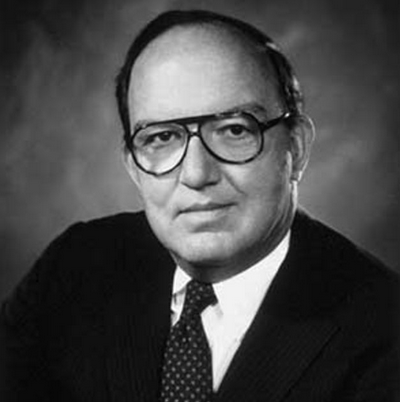In Memoriam: Fay Vincent
 In the introduction to his memoir, Fay Vincent wrote, “Baseball is in the public domain. The game is ours.”
In the introduction to his memoir, Fay Vincent wrote, “Baseball is in the public domain. The game is ours.”
A longtime SABR member who served as the eighth Commissioner of Baseball from 1989 to 1992, Francis T. Vincent Jr. spent his career and public life after baseball encouraging those in the game to live up to those words. Vincent died at the age of 86 on February 1, 2025, in Vero Beach, Florida.
Vincent’s brief and turbulent tenure as Commissioner was marked by a variety of thorny issues, starting with the interruption of the 1989 World Series by the Loma Prieta earthquake that struck the San Francisco Bay area. He also contended with labor relations, expansion, TV superstations, and the banishment from baseball of Yankees owner George Steinbrenner and pitcher Steve Howe. Ultimately, though, his stance on the Commissioner’s role differed fundamentally from those of too many club owners for him to keep his job for long.
As Vincent expressed in his 1992 letter of resignation, “I accepted the position believing the Commissioner has a higher duty and that sometimes decisions have to be made that are not in the best interests of some owners. Unique power was granted to the Commissioner of Baseball for sound reasons – to maintain the integrity of the game and to temper owner decisions predicated solely on self-interest. The Office should be maintained as a strong institution. My views on this have not changed.”
Vincent added, “I remind all that ownership of a baseball team is more than ownership of an ordinary business. Owners have a duty to take into consideration that they own a part of America’s national pastime – in trust. This trust sometimes requires putting self-interest second.”
Vincent became Commissioner in the fall of 1989 following the untimely death of his close friend A. Bartlett Giamatti at the age of 51. Giamatti had been consumed all year by the saga of Pete Rose’s expulsion from the game on gambling charges. Vincent, who had been serving as Deputy Commissioner for just five months, stepped in to fill Giamatti’s shoes. The World Series earthquake that rocked the Bay Area in October was Giamatti’s first test, as the biggest natural disaster ever to strike a US sporting event.
“I was proud of what happened,” Vincent told SABR member Erik Malinowski of FoxSports.com in 2014, “partly because I wasn’t sure whether I was making a good set of decisions. You never know.” He likened the circumstances to those in London during the Blitz and viewed Winston Churchill as a role model, noting, “You have to recognize that, in a crisis, there are some institutions that have to survive.”
Francis Thomas Vincent Jr. was born on May 29, 1938, in Waterbury, Connecticut. His father, Fay Sr., was a well-known local athlete and later an NFL referee. He was recruited to play football at Williams College, but sustained a life-changing accident, a fall from a fourth-floor window of a campus residence building, that left him temporarily paralyzed and reliant on a cane for the rest of his life.
After rehabbing his injuries — “My entire day was geared around waiting for that Yankee game,” he recalled. “When there was no game it was very sad.” — he graduated from Yale Law School in 1960 and took a job with a New York law firm. In 1965, he married Valerie McMahon and They had three children, Anne and twins William and Edward.
In 1978, he joined the Securities and Exchange Commission in Washington, DC, as associate director of the Division of Corporate Finance. Soon afterward, he received a call from an old college friend and became President and Chief Executive Officer of Columbia Pictures, where the company he led put out major hits that included Kramer vs. Kramer (1979), Gandhi (1982), and Tootsie (1982). The Coca-Cola Company purchased Columbia in 1982. Vincent served as an executive vice president of the beverage giant until July 1988. The following year, after the hiring of his friend and former Yale University President Bart Giamatti, he began his brief career in baseball at the age of 50.
Vincent stayed involved with baseball after he left the Commissioner’s Office. He joined SABR in 2005 and became an invaluable supporter of the Jerry Malloy Negro League Conference and other programs over the next two decades. He also spent several years conducting videotaped interviews with scores of prominent baseball figures, including Marvin Miller, Buck O’Neil, Yogi Berra, Frank Robinson, and Larry Doby.
Vincent’s oral history interviews — some of which he graciously allowed SABR to make available online in the SABR Oral History Collection — were the focus of his three books: The Only Game in Town: Baseball Stars of the 1930s and 1940s Talk About the Game They Loved (2006); We Would Have Played for Nothing: Baseball Stars of the 1950s and 1960s Talk About the Game They Loved (2009); and It’s What’s Inside the Lines That Counts: Baseball Stars from the 1970s and 1980s Talk About the Game They Loved (2010).
He spoke about his interview process with SABR’s John McMurray in 2015, saying, “There’s something about baseball. There’s a certain lighthearted appeal. Baseball is a bunch of guys sitting around a lobby waiting for the ballgame to come up and for them to go out and play. And they’re telling stories about each other. It’s just part of the tradition.”
Related links:
- Read Fay Vincent’s SABR biography, by Rory Costello
- Listen to Fay Vincent’s Hall of Fame interviews in the SABR Oral History Collection
Originally published: February 2, 2025. Last Updated: February 2, 2025.

